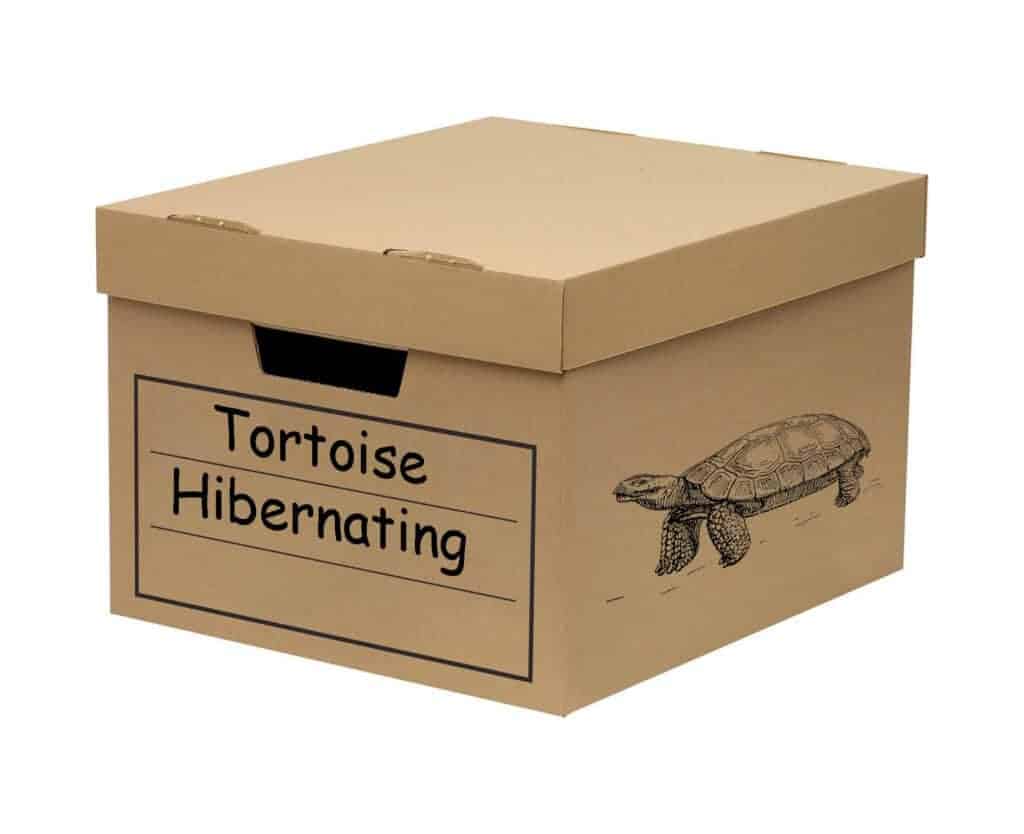Ideally, all tortoises that can do so should hibernate, so it’s best to hibernate your tortoise if possible. It may be possible not to hibernate your tortoise if it’s overwintered, but this is not something you should do every year. Hibernating your tortoise is the healthier and safer option.
Hibernation is a widely discussed topic when it comes to tortoises. Although most people are aware that tortoises hibernate, new owners aren’t sure whether hibernation is necessary, and if it is, whether it should be done every winter. Furthermore, it’s hard to know what happens in the long term if a tortoise doesn’t hibernate. Asking ‘experts’ left and right might well result in getting different answers, which creates even more confusion.
So, do you have to hibernate your tortoise?
Why Do Tortoises Hibernate?
Hibernation is an adaptation found throughout the animal kingdom among many species, including many species of tortoise. An annual period of hibernation is used by tortoises to survive the cold winter.
A tortoise is not able to produce its own body heat as, like all reptiles, it is a cold-blooded animal. Therefore hibernation becomes an essential survival mechanism in order to stay alive until the cold weather passes. Tortoises are used to warmer weather, and they cannot function at full capacity at very low temperatures.
The metabolism of the tortoise slows down when temperatures drop, meaning that digestion, reproduction, and even heartbeat and other vital processes also slow down. It is quite a different metabolic state than routine sleep, and it is a time during which you cannot wake them. Every year, some tortoise species hibernate to stay healthy and alive, both in the wild and in captivity.
If they do not hibernate, or do not hibernate correctly, not only are tortoises at risk of getting ill, but they may even die, especially if they live outdoors and the cold winter weather is too harsh on them.
Which Tortoise Breeds Hibernate and Which Ones Do Not?
As an owner it is important to note that not all tortoise breeds need to hibernate. If you’re looking to buy a tortoise and you don’t want to go through the trouble of preparing them for hibernation, you might want to look into the species that don’t require hibernation.
Having said that, non hibernating species do not hibernate because they hail from tropical areas of the world that experience only two seasons; a dry season, and a wet season, neither of which get particularly cold. Therefore you must ensure that non-hibernating species are kept sufficiently warm at all times, as they are probably even less well adapted to low temperatures as hibernating species.
Species that hibernate include many European and West Asian species such as:
- Russian Tortoise
- Desert Tortoise
- Marginated Tortoise
- “Greek” or “Spur Thigh” Tortoise
- Hermann’s Tortoise
Meanwhile, species that don’t require hibernation include tropical and subtropical species such as:
- Leopard Tortoise
- Sulcata/African Spurred Tortoise
- Golden “Greek” Tortoise
- Red Footed Tortoises
- Hinge-Back Tortoises
- Egyptian Tortoise
- Radiated Tortoise
- Yellow Footed Tortoises
Benefits of Hibernation
Hibernating your tortoise comes with multiple benefits worth considering if you are undecided about putting your tortoise into hibernation.
- It Mimics Their Natural Behavior
If you want to mimic the natural habitat of your tortoise as closely as you can, hibernating is frankly a no brainer. While in the wild, tortoises hibernate in order to survive and stay healthy. When winter is over, they become active once again and start looking for food.
- It Keeps the Tortoise Healthy
Tortoises hibernate in order to survive. If you want to make sure your pet reptile stays healthy, hibernating is a great, cost effective, way to do so, especially once you’re experienced with what’s involved in preparing for hibernation.
If you own a tortoise species that normally hibernates in the wild, its body is instinctively programmed to hibernate, so you should try to honour this instinct if you possibly can.
- It Beneficially Slows Down the Metabolism
One of the best things about hibernation is that it slows down the tortoise’s metabolism for a while. Basically, not hibernating increases the food intake of the tortoise, which in turn makes the tortoise grow faster. This might not sound like a problem, but it can actually cause a number of health issues. Think of it like the tortoise equivalent of a bodybuilder abusing anabolic steroids! Hibernating will allow the tortoise to grow at a more natural pace.
Not to mention that hibernation can prevent any strain on the renal system, as well as kidney or bladder stones, given that this system will effectively be ‘out of commission’ for several weeks or months.
Disadvantages of Hibernation
Although if carried out correctly hibernation is unequivocally beneficial for a tortoise, hibernation also has its drawbacks, chiefly that the process is quite involved and overwhelming for someone who has not done it before:
- You Need to Help the Tortoise Before, During, and After Hibernation
Prior to hibernation you must gradually taper down your tortoise’s diet, such that they do not have food in their stomach when entering hibernation. You must also make sure the tortoise is of a sufficient weight, as fat reserves will be used up to keep the tortoise alive during hibernation.
To hibernate your tortoise, you must create the ideal environment for it to do so, which means making sure you use the right setup that will not harm your tortoise.
The gold standard in this regard is to place the tortoise in a purpose bought fridge that has an air supply. This can be quite an expensive investment, so it’s difficult for someone on a budget to afford it. On top of that, you have to keep monitoring the temperature, so the tortoise stays safe at all times.
Meanwhile, using shredded paper insulation in the box the tortoise will hibernate in, whether in a fridge or otherwise, can also be extremely dangerous, as the tortoise may be strangled by it. Indeed I have known owners whose tortoises have sadly died under these circumstances.
When the hibernation period draws to a close, you must make sure you wake the tortoise gradually by putting it in an area at room temperature for several hours. The temperature then has to rise gradually. After that, you should place it somewhere warm and with plenty of light, allowing it to fully wake up. Ensuring the tortoise has access to drink and food at this point is also important.
- The Tortoise May Wake Too Early
Another concern regarding hibernation is that the tortoise may wake too early, especially if it lacks the right conditions. This may even lead to the death of the tortoise if you do not realise they have awoken, because they may ultimately starve.
- Not Safe to Hibernate Very Young, Ill Tortoises
Hibernating a tortoise that is younger than 3 years or that is ill can be very dangerous as they are unlikely to have sufficient fat reserves. Sick, underweight tortoises may end up being in a worse state because of hibernation and they will be at risk of death.
Overwintering Benefits
If you do not wish to hibernate your tortoise during winter, you can choose to overwinter it. There are some benefits to overwintering a tortoise, such as:
- You will not have to worry about the tortoise dying during hibernation due to incorrect conditions. You put the tortoise at risk if you do not maintain the right temperature and other conditions while they hibernate. During overwintering, this will not be a concern.
- It allows you to keep eyes on the tortoise at all times, which is not possible during hibernation. In hibernation, the tortoise will be asleep for a long period, and you cannot watch it all the time. While overwintering it, it will still be active, and you will be there to care for it.
Overwintering Drawbacks
Overwintering comes with drawbacks as well, which include:
- Not respecting the natural process of the tortoises. In the wild, tortoises hibernate, and overwintering it doesn’t let them do this. It’s unknown whether overwintering is healthy for a tortoise in the long term, so you need to decide whether you want to take the risk.
- It may not be right for your pet to do this, and some people would call it lazy husbandry.
How Can You Hibernate Your Tortoise?
You can use several methods to hibernate your tortoise. Here are the ones that you can choose from:
- The Natural Method
The natural method involves allowing your tortoise to hibernate outdoors. However, while it may be the approach tortoises take in the wild, it’s not always the best choice, especially if you live in an area with very harsh winters. Tortoises will bury themselves in the soil to hibernate, but if it gets too cold, they may not be able to survive the winter. So, this is not the recommended method if you live too far from the equator.
- The Fridge Method
To hibernate the tortoise using this method, you will put it in a fridge that allows you to control the temperature. It needs to have an air supply hole, and you will have to monitor the fridge’s temperature using a thermometer. The good thing about this method is that you have control over the temperature.
It is important to have a backup source of power for the fridge, probably in the form of a generator, should you suffer a power cut.
- The Box Method
With this method, you place the tortoise in a small box and add some insulation, like newspaper or soil, after which you put the small box inside a bigger box. The bigger box will in turn be stuffed with insulation material and placed in an unheated area such as a garage or shed. Again, this requires a thermometer to check the temperature, but you should know it is harder to control the temperature using this method.
Final Thoughts
Hibernating your tortoise is necessary if you want to make sure it stays healthy and not at risk of accelerated growth and other health issues. If you do choose to overwinter instead, make sure you don’t take this approach every year.




